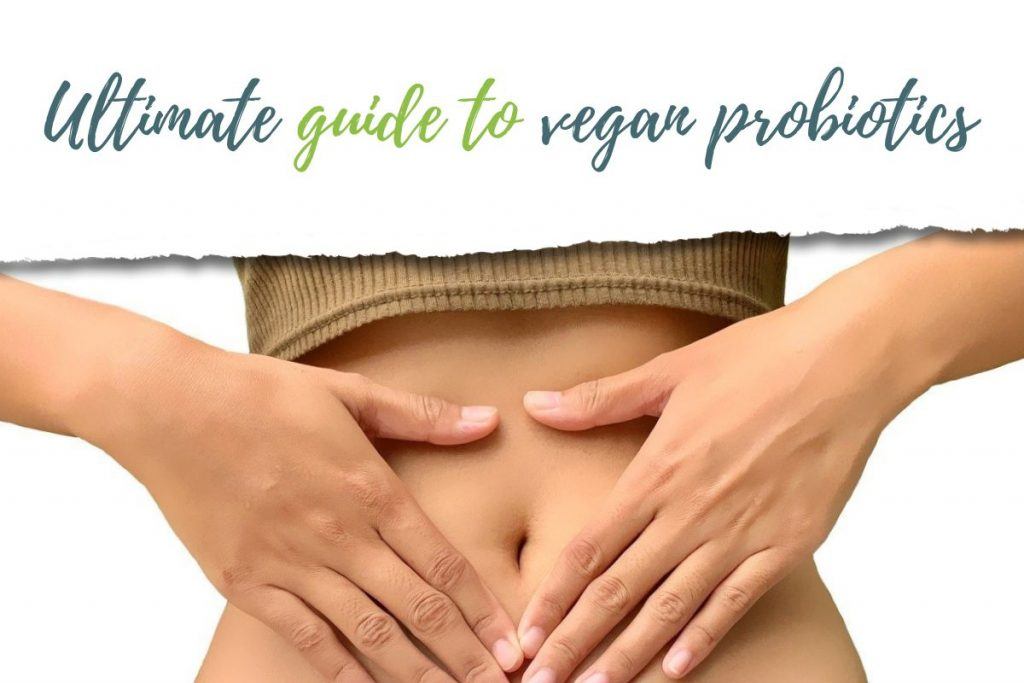
Probiotics offer powerful health benefits and help to restore and maintain gut bacteria. They are available in several different foods or they can be taken as a supplement—but not every product is right for those who don’t eat animal-based food. Vegan probiotics are out there and many of them offer all of the benefits other probiotics without sacrificing anything when living on a plant-based diet.
Many benefits of probiotics are well-known, but researchers and the medical community still continue to discover even more reasons why supplementing your vegan diet with probiotics is a wise dietary decision.
One of the most recent discoveries concerning probiotics is that different strains have different positive effects on the body. Consuming a variety of probiotics, either through eating different probiotic-containing foods or by supplementing with a probiotic blend, provides the greatest health results.
In general, the benefits of probiotics include:
Reducing the Risk of Cancer
Page Contents:

Studies have shown that an unhealthy gut increases a person’s risk for cancer. Gut microbiota disturbances tend to go hand-in-hand with inflammatory bowel disease and several types of cancer. The healthier your gut the lower your risk for a variety of health issues, possibly including certain types of cancer.
Improved Digestion
Probiotics hang out in the gut and help break down food. This speeds digestion, which can alleviate constipation and move waste through the body faster in general. There is also evidence probiotics help alleviate symptoms of Crohn’s disease and IBS.
Vaginal Health
Bacteria are essential for vaginal health, but antibiotics, spermicides, and birth control pills all tend to throw off the balance of good vaginal bacteria. Probiotics can help to restore this balance and prevent a variety of vaginal health issues.
Mental Health
There is some evidence that gut health and mental health are tied together. Research suggests that consuming probiotics could reduce the effects of depression and anxiety. Some believe this might be linked to a placebo effect, but if consuming probiotics provide other benefits and help you feel better overall, you have nothing to lose.
Reduced Risk for Type 2 Diabetes and Other Metabolic Diseases

There is evidence that probiotics can reduce a person’s risk or help to manage metabolic diseases, including type 2 diabetes, obesity, and non-alcoholic fatty liver disease. There is also research showing that probiotics can help with glycemic control and lipid metabolism in those with type 2 diabetes.
Research has also shown that probiotics can ease the negative side effects of taking antibiotics. About a third of people taking antibiotic medication experience digestive distress, including diarrhoea. Doctors often recommend taking probiotics while on an antibiotic regiment to prevent a condition known as antibiotic-associated diarrhoea (AAD).
Probiotic-rich foods can be a delicious addition to your diet. The most popular food source for probiotics is yogurt, but this is not an option for vegans. Luckily, there are vegan probiotic food sources, as well as vegan supplements, that allow you to enjoy the health benefits of probiotics without sacrificing your commitment to living a vegan lifestyle.
The best vegan probiotics food sources include:
Fermented Foods
Fermentation is a method for preserving fresh foods. It is a process that triggers a chemical reaction in food and uses good bacteria to turn food that tends to spoil quickly into something that lasts longer and that offers additional health benefits.
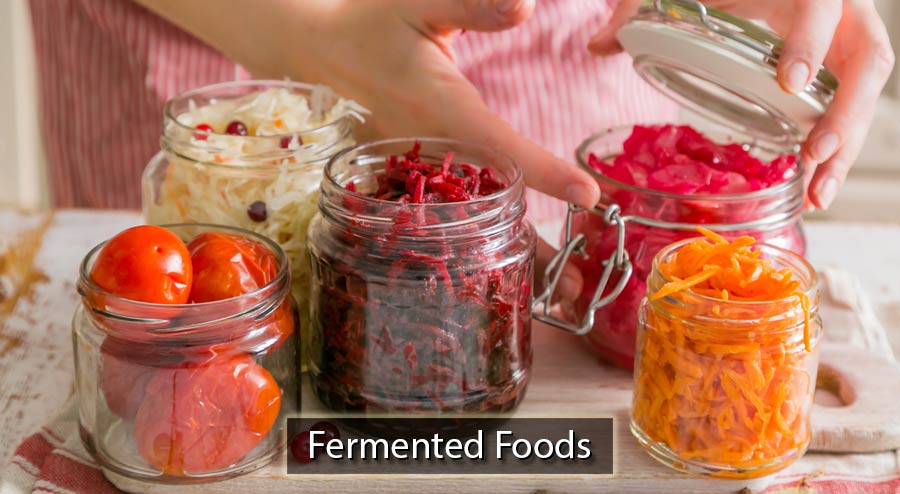
Fermented foods go through a process in which micro-organisms consume the sugars or acids in foods. The process is similar to the way in which plants consume carbon dioxide in the air and send it back out as oxygen.
There are four ways to ferment food, including:
- Using salt in an anaerobic environment
- Using salt in an aerobic environment
- Using high concentrations of sugars in an anaerobic environment
- Fermenting ferments in an aerobic environment
The first two methods utilize a salt brine or coating to initiate fermentation. Salt creates an acidic environment that destroys bad bacteria and allows good bacteria to get to work. The difference between anaerobic or aerobic is the presence of water. Using salt in an anaerobic environment is a popular way to ferment vegetables and how foods like sauerkraut and kimchi are made.
Salt can also be used in an aerobic environment, which is dry, but this method is most commonly used for meats.
The third method, fermenting food with high concentrations of sugars, is how cheese, yogurt, and wines. These foods are high in sugar and use sugar in the fermentation process.
Finally, the fourth method of fermenting includes ferments in an aerobic environment, which is how vinegar is made. Foods can be fermented and turned into alcohol which is then turned into vinegar. This vinegar can then be used to preserve other foods, such as pickles or as an ingredient in mustard or ketchup.
The majority of foods on our list below are fermented through the first method—using salt in an anaerobic environment.
Once foods are fermented and ready to provide a boost of probiotics, they need to be stored in airtight containers in a dry location. Many of the foods on our list should be kept in the refrigerator, but check the instructions associated with each food to ensure proper storage.
Sauerkraut
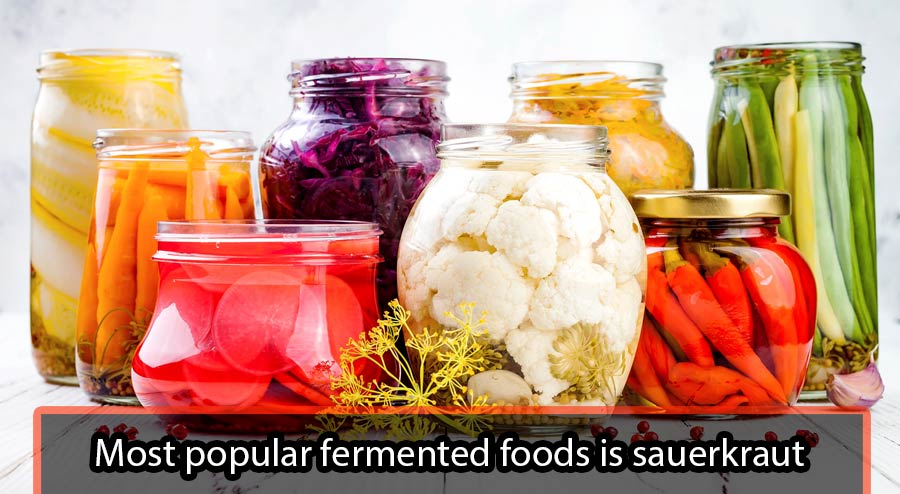
One of the most popular fermented foods is sauerkraut, which is fermented cabbage. Fermenting cabbage causes a reaction that converts the sugar in the vegetable into lactic acid, which results in a sour taste.
Sauerkraut provides a hefty dose of probiotics and vitamins C and K. It’s also a great source of potassium.
Cabbage can be used as a condiment, mixed into salads, or eaten on its own. Pasteurizing sauerkraut tends to destroy some of the beneficial bacteria, so unpasteurized sauerkraut is the best option. This can usually be found at health food or specialty supermarkets, or you can make it yourself at home.
Kimchi
Kimchi is another fermented food high in probiotics. It is also made from cabbage, but it contains spices not found in sauerkraut. It’s also rich in vitamins and antioxidants. Like sauerkraut, kimchi can be found in stores or can be easily made at home.
Keep in mind some versions of kimchi contain seafood, so it’s important to check the fermenting process to ensure the product is truly vegan.
Pickled Vegetables
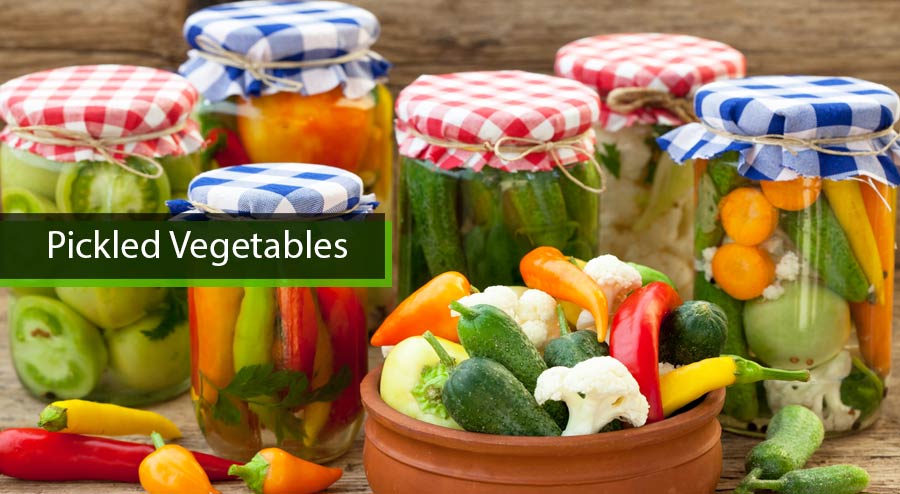
Pickling is a process similar to that used to make sauerkraut and cabbage. It is a process of preserving or extending the life of food via anaerobic fermentation in brine (salt water) or soaking or immersing in vinegar.
Pickling changes the flavor and texture of food. Think of pickles, which are actually pickled cucumbers. Both tend to have a crunch, but a pickle crunch is different than a cucumber crunch. And the flavor is much different. Pickles have an intensely sour flavor, while cucumbers tend to be mild and smooth.
You can pickle just about any vegetable and the process will result in a probiotic-rich food. Some of the best vegetables to try pickled include radishes, cucumbers, green beans, and carrots. Pickled vegetables can also be seasoned to suit a variety of tastes.
Try adding pickled vegetables to a salad for an extra kick or serve them as a side dish.
Pickled foods tend to be high in salt because they are soaked in salt, so you’ll need to monitor your intake carefully if you’re concerned about sodium.
Kombucha
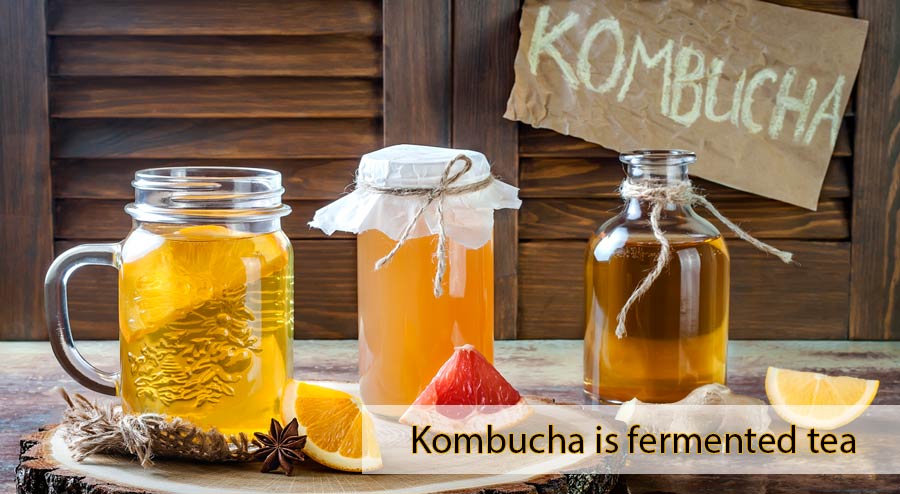
Kombucha is fermented tea. It offers the benefit of fermented foods but in liquid form. You make kombucha by brewing it with a culture of yeast and bacteria. Freshly made kombucha tends to be gelatinous, but it can be mixed with additional liquid to create a refreshing, fizzy beverage. Kombucha is available ready made or it can be brewed at home.
Keep in mind, kombucha does contain trace amounts of alcohol, so it’s not something that should be consumed by anyone who is pregnant, breastfeeding, or avoiding alcohol.
Kefir
Many types of kefir are made with dairy products, but water kefir is an option for vegans.
Water kefir is made with water kefir grains, which can be added to sugar water, coconut water, or juice. The final product has a mild flavor and is relatively low in calories.
Handled properly, kefir grains can last for years, so you can continue to brew water kefir beverages at home once you get the process started. Kefir products are also available in stores, but it’s important to carefully check the product to make sure it doesn’t contain milk kefir or milk kefir grains.
Tempeh
Tempeh is made from tofu and soy. It is made by fermenting soybeans and results in a richly flavored tofu that can be used in salads, stir fry, or on sandwiches. Tempeh makes a great meat substitute and doubles as a great source of protein for vegans.
Sourdough Bread
Sourdough bread is much like other types of bread as a final product, but it’s made with a sourdough starter. A starter is a combination of water and flour that has been fermented and “fed” to keep it alive for future loaves of bread.
Keep in mind that many types of bread advertised as sourdough actually contain no probiotics. To be a true sourdough the bread must be made from a starter, which should be listed in the ingredients. In many cases, if the ingredient list contains yeast it means it is not a true sourdough from a starter.
Miso
Miso is a type of broth or soup. It is an excellent probiotic option for vegans but is also rich in B vitamins and antioxidants. Miso is also available in paste form, which can be used to make sauces, dressings, and marinades.
Fortified Dairy Alternatives
Some dairy alternative food and beverage products have been fortified with probiotics. Vegan yogurts, soy milk, and nut milks can all be fortified with healthy bacteria and also provide a number of other nutritional benefits. Look for the word “lactobacillus” on the label to determine if a vegan dairy product has been fortified with probiotics.
Probiotic Supplements
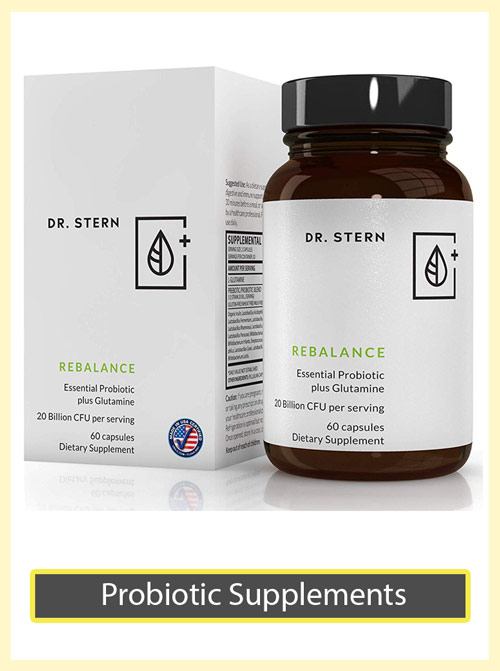
In addition to the food sources that offer probiotic benefits, vegans can also get probiotics from supplements. Supplements can be taken in pill or capsule form like vitamins or in powder form and added to food and beverages.
Supplements are a great option for those who aren’t fond of the sometimes-potent sour flavor many probiotic-rich foods contain.
Keep in mind that not all probiotic supplements are vegan. Labels should be carefully read and it’s also a good idea to research what other people have to say about a supplement to make sure the source is trustworthy. Probiotic supplements are not regulated, which means there’s no way to verify a product is what it says it is without doing additional research.
So, are probiotics vegan? The foods listed above are and many of the best vegan probiotics’ supplements are. It’s easy for vegans to get the benefits of probiotics, as long as they choose non-dairy sources.
Recommended Supplement
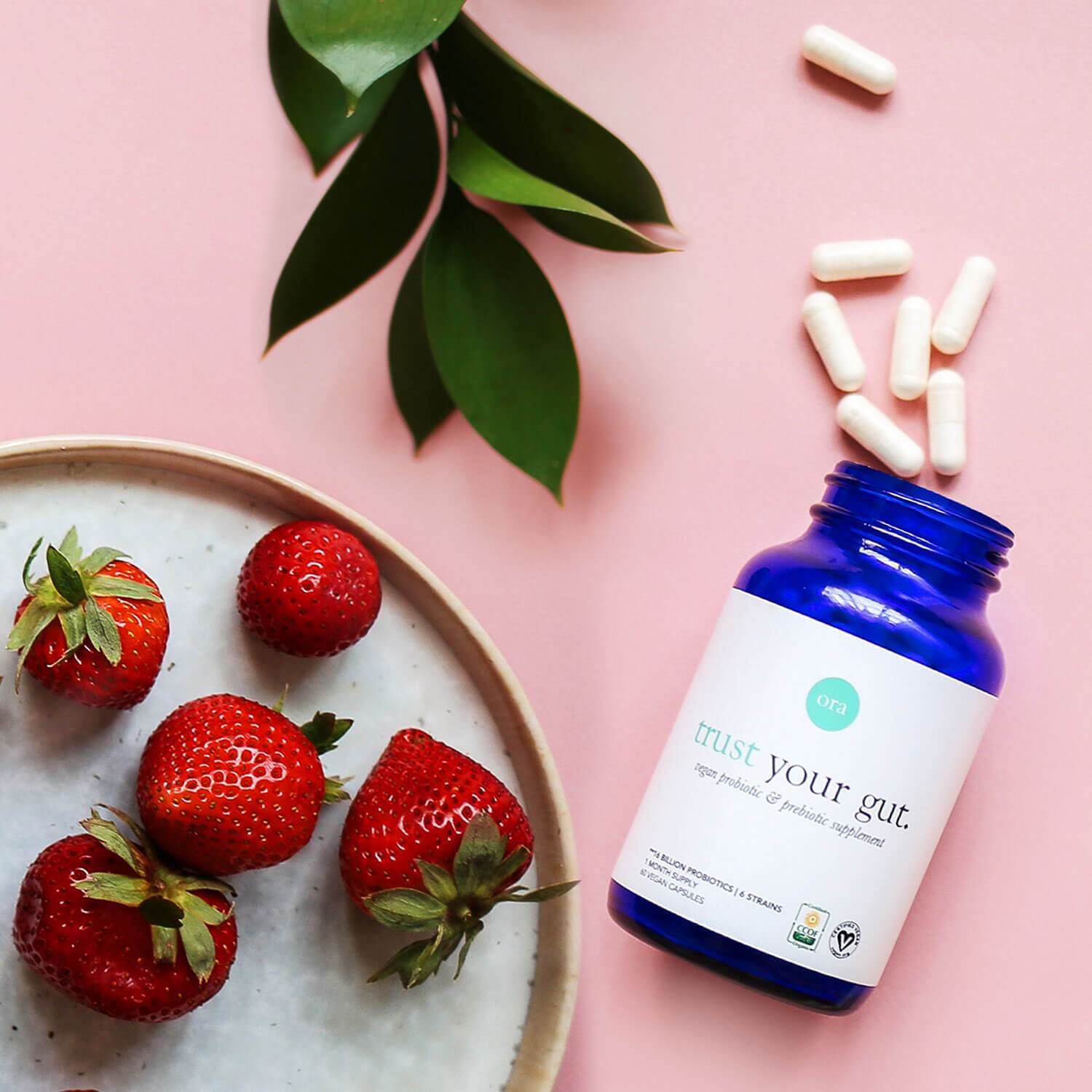
Ora Trust Your Gut Probiotic Blend is an organic probiotic and prebiotic. It contains 20 billion probiotics per serving with six strains of probiotic. It is available in capsule and powder form, so you can take your probiotic with one quick swallow of water or use the vegan probiotics powder and sip on the same drink for a bit of time.
The Ora probiotic supports digestive health and peak immune function.
Ora uses some of the most acid-resistant probiotic strains available, which means you can be sure you are getting a product that’s going to do what it promises.
Additionally, this probiotic contains 20 percent of your daily fiber intake.
Ora uses adds prebiotics to its probiotic supplement to “fuel” the probiotic. This means the good bacteria are able to survive and thrive in your gut.
Ora’s Probiotic Blend is also free of sweeteners, colors, artificial flavors, and preservatives. There are absolutely no filter ingredients included, but the supplement still tastes great in water or added to a smoothie.
Ora’s probiotic ingredient list includes:
- Organic apple
- Jerusalem artichoke
- Organic raspberry
- Lactobacillus acidophilus
- Lactobacillus reuteri
- Bifidobacterium bifidum
- Bifidobacterium breve
- Bifidobacterium lactis
- Bifidobacterium longum
- Organic Tapioca Starch
The Ora Probiotic Blend contains clinically documented and acid resistant strains of probiotics that provide a comprehensive mix of probiotic species for optimal digestive health. This blend also supports immune function, mood balance, hair & skin health, and pathogen-fighting support.
Incorporating vegan probiotics supplements into your diet via food or supplements, or a combination of both could be one of the smartest health decisions you’ve ever made. If you are new to probiotics, begin by trying a few foods that are high in probiotics and see if you like the sour flavor.
If not—or if you don’t feel as though you can consume enough to provide you with the greatest benefits—a supplement such as the Ora Probiotic Blend is a great vegan addition for those who are new to probiotics or those who are experienced with them and looking for a healthy, non-animal source supplement.


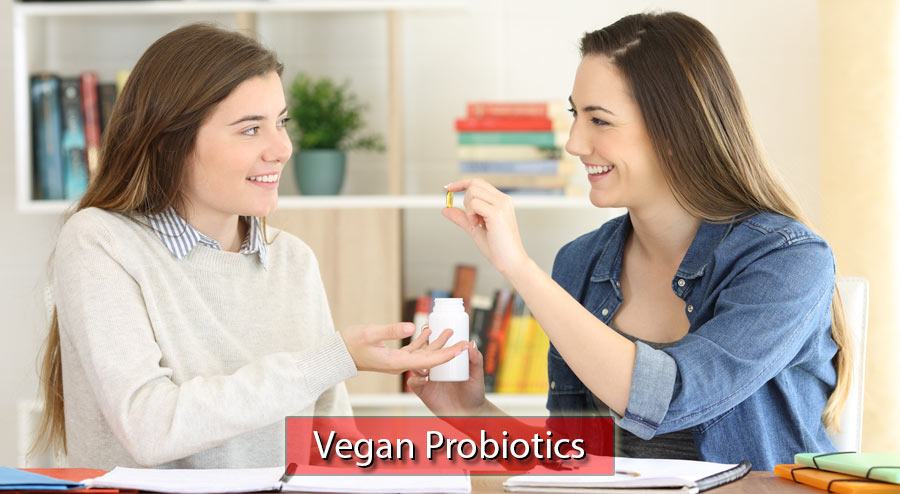
Wow, that is amazing! It’s a great read! I learned something new today. Probiotics seem like a really healthy addition to anyone’s daily nutrition stack.